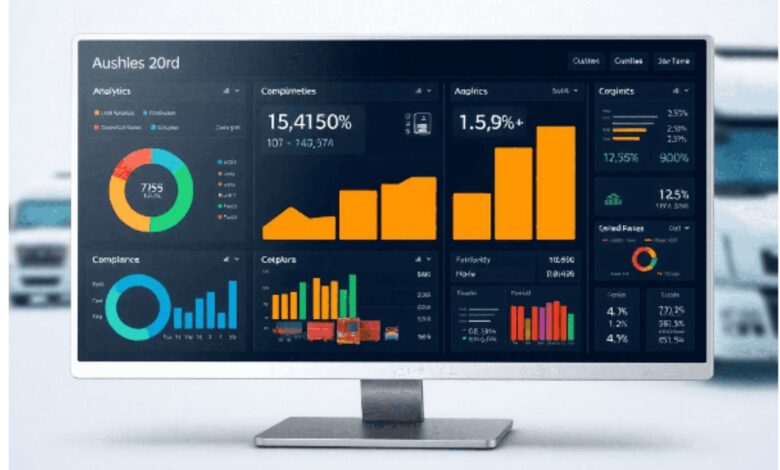Transforming Transportation: The Role of RMIS in Risk Management

Introduction
Registry Monitoring Insurance Services (RMIS) plays a crucial role in the transportation industry, specializing in compliance monitoring and risk management. It offers a wide range of tools tailored for freight transportation companies, brokers, and third-party logistics providers (3PLs) to improve their operations by:
- Reducing risks before they occur
- Making the onboarding process smoother
- Managing compliance automatically
This article will discuss how RMIS is changing the way risks are managed in the industry, ensuring compliance while also improving efficiency.
Understanding RMIS and Its Role in Risk Management
Registry Monitoring Insurance Services (RMIS) is an important system used in the transportation industry to improve compliance and manage risks. Here are the main features of RMIS:
Key Components of RMIS
- Compliance Monitoring: Automates processes to ensure adherence to regulatory requirements related to driver safety, cargo security, and environmental protection.
- Risk Management Information System: Centralizes incident, claim, and safety data, providing a comprehensive view of potential risks.
Why are effective risk management systems crucial for organizations? Because they help reduce risks and keep the business running smoothly.
By using RMIS, transportation companies can find weaknesses in their operations before they become bigger problems. This proactive approach not only protects them from legal issues but also makes their operations more efficient.
The integration of RMIS ensures that businesses are equipped to navigate the complex regulatory landscape while streamlining compliance efforts.
Enhancing Supply Chain Visibility with RMIS
Transportation companies face significant challenges in achieving end-to-end visibility across their supply chains. These challenges include:
- Fragmented Data Sources: Information often resides in silos, complicating the aggregation of critical data.
- Manual Processes: Reliance on manual reporting can lead to delays and inaccuracies, hindering timely decision-making.
- Dynamic Market Conditions: Rapid changes in regulations or market demands can obscure real-time insights.
RMIS effectively addresses these issues by providing a centralized platform for capturing and analyzing incident data. This system enables organizations to:
- Maintain a holistic view of their supply chain operations, allowing for better tracking of incidents and compliance.
- Facilitate proactive risk mitigation strategies through timely access to relevant information.
By leveraging RMIS, transportation companies enhance their operational efficiency, ensuring they remain agile and responsive to evolving risks within their supply chains.
Proactive Compliance Management through Automation
The transportation sector navigates a highly complex regulatory landscape. Companies face numerous legal risks stemming from:
- Driver safety regulations
- Cargo security mandates
- Environmental compliance
- Trade sanctions
Non-compliance can lead to severe penalties and operational disruptions.
Registry Monitoring Insurance Services (RMIS) equips transportation businesses with compliance automation tools designed to streamline adherence to these regulations. By automating compliance processes, RMIS significantly reduces manual efforts required for tracking and reporting compliance metrics. This automated approach not only minimizes the chances of non-compliance but also enhances overall operational efficiency.
Through effective regulatory requirements handling, RMIS helps organizations proactively manage legal risks. The result is a more resilient operational framework that allows for swift adaptations in response to evolving regulations, ensuring both sustainability and growth within the industry.
Data-Driven Decision-Making for Real-time Risk Assessment
Using advanced analytics techniques within RMIS improves organizations’ ability to conduct real-time risk assessments. This capability allows for timely actions that can reduce potential threats before they worsen. Key aspects include:
- Real-time assessment capabilities: RMIS platforms can analyze large amounts of data instantly, providing insights into emerging risks.
- Data-driven decisions: Organizations are empowered to make informed choices based on current data trends and patterns.
For example, transportation companies have used RMIS to effectively identify and respond to cyber threats. By analyzing network traffic and user behavior, they proactively address weaknesses. Similarly, during climate-related disruptions, RMIS analytics enable companies to adjust logistics dynamically, ensuring operations remain uninterrupted.
These examples show how data-driven decision-making is not just a trend but a necessity in today’s fast-paced transportation industry, improving resilience against unpredictable challenges.
Optimizing Fleet Maintenance Practices with RMIS Insights
Transportation companies can significantly enhance their fleet maintenance practices by utilizing RMIS for proactive monitoring of vehicle health and performance metrics. Here are some key benefits:
1. Vehicle Health Metrics Tracking
RMIS offers tools for continuous monitoring of critical vehicle indicators such as engine performance, tire pressure, and fuel efficiency. This real-time data helps in identifying potential issues before they escalate into costly repairs.
2. Maintenance Risks Identification
With access to historical maintenance data and predictive analytics, organizations can identify patterns indicating potential failures. This enables timely interventions to mitigate risks associated with vehicle breakdowns.
3. Safety Risks Management
Insights derived from RMIS allow businesses to implement preventive measures that enhance safety protocols. By addressing identified risks promptly, companies can ensure a safer working environment for drivers and reduce liability concerns.
Leveraging RMIS insights fosters an effective strategy for maintaining fleet integrity while minimizing disruptions in operations.
Strengthening Business Continuity Planning Efforts using RMIS Tools
Risk Management Information Systems (RMIS) are crucial in creating effective business continuity plans. They provide extensive support to organizations, helping them tackle various disruption scenarios. Here’s how RMIS contribute:
1. Vulnerabilities Identification Assistance
RMIS have specialized tools that make it easier to identify weaknesses in critical processes. This ensures that companies are aware of potential areas that could disrupt their operations.
2. Robust Plan Development
RMIS offer a structured approach to developing strong business continuity plans. These plans incorporate risk assessment and mitigation strategies, making sure organizations are ready for unexpected events.
The transportation industry greatly benefits from these features as they improve operational resilience. By using RMIS, companies can ensure that their plans are not only comprehensive but also flexible enough to adapt to changing situations, ultimately protecting their business continuity in an unpredictable environment.
Case Study: Truckstop.com’s Strategic Acquisition of an RMIS Provider
Truckstop.com has strategically positioned itself in the freight transportation industry through its acquisition of an established RMIS provider. This move focuses on enhancing service offerings by integrating automated onboarding solutions with advanced risk management capabilities.
Key aspects include:
- Integration of Technologies: The acquisition allows Truckstop.com to combine its existing solutions with RMIS tools, streamlining workflows for brokers.
- Operational Efficiency Gains: Freight transportation companies and brokers have reported significant improvements in evaluating carriers’ safety and financial requirements post-acquisition.
- Increased Compliance Monitoring: Enhanced compliance capabilities facilitate adherence to regulatory requirements, minimizing risks associated with non-compliance.
This case study exemplifies how strategic acquisitions can transform operational practices, providing a competitive edge in the evolving transportation landscape.
Conclusion: Embracing the Future with Effective Risk Management Solutions like RMIS in Transportation Industry
The transportation sector faces increasing complexities that demand innovative solutions.
- Embracing RMIS: Adopting RMIS technology is essential for navigating evolving market dynamics.
- Sustainable Growth: Companies leveraging RMIS can achieve operational efficiency and compliance, ensuring resilience against emerging risks.
Future trends exploration indicates that the integration of advanced analytics within RMIS will further enhance decision-making capabilities. Transportation businesses must prioritize these technologies to safeguard their operations and promote sustainable growth over time. Embracing RMIS not only transforms risk management practices but also positions organizations to thrive in a competitive landscape.



